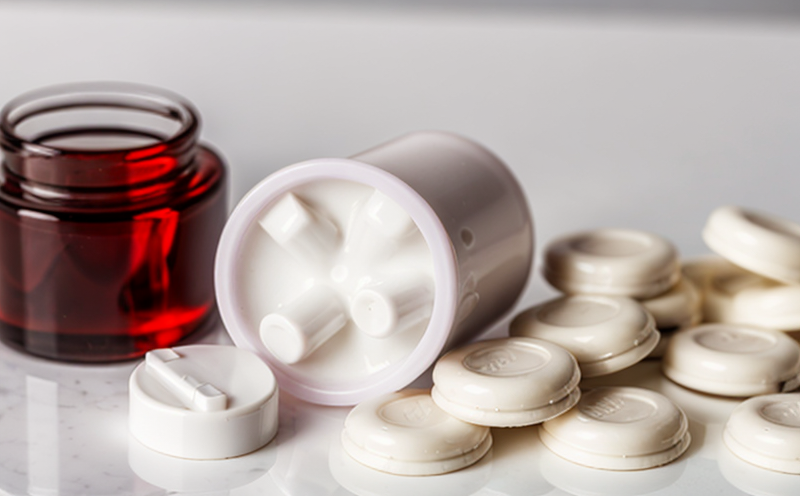USP Sublingual Tablet Disintegration Testing
The USP Sublingual Tablet Disintegration Test is a critical procedure within pharmaceutical development and manufacturing. This test ensures that sublingual tablets, which are designed to dissolve rapidly under the tongue for quick absorption into the bloodstream, meet the stringent quality standards set forth by the United States Pharmacopeia (USP). The primary goal of this test is to verify that these medications disintegrate properly within acceptable timeframes, ensuring they deliver their active ingredients as intended.
The USP specifies a series of tests for different types of oral solid dosage forms. For sublingual tablets specifically, the test involves placing the tablet in a special medium designed to mimic physiological conditions, such as saliva and mucosa. The sample is then subjected to a controlled environment that simulates the natural disintegration process.
The importance of this testing cannot be overstated, especially for medications intended to work quickly upon administration. Immediate onset of therapeutic effects is crucial in managing acute symptoms or conditions where rapid delivery is vital. Failure to meet these standards could lead to inconsistent drug efficacy, potential side effects, and even safety issues.
Pharmaceutical testing laboratories specializing in this service ensure compliance with the latest USP guidelines. They use advanced instrumentation and highly trained professionals to conduct these tests accurately. The process involves meticulous preparation of the sample, precise control over environmental conditions, and careful observation of disintegration times. Compliance officers and R&D engineers rely on such services to maintain product quality and meet regulatory requirements.
The USP Sublingual Tablet Disintegration Test is not just a formality; it plays a pivotal role in ensuring patient safety and efficacy. By adhering strictly to the prescribed methods, pharmaceutical companies can gain confidence that their products will perform reliably under real-world conditions. This testing process also helps in optimizing formulations, improving drug stability, and enhancing overall product quality.
- Compliance with USP Standards: Ensures strict adherence to the latest USP guidelines for sublingual tablets.
- Advanced Instrumentation: Utilizes state-of-the-art equipment to perform precise disintegration tests.
- Meticulous Sample Preparation: Carefully prepares each sample to ensure accurate testing results.
- Careful Observation: Monitors the disintegration process closely for reliable and consistent data.
Why It Matters
The USP Sublingual Tablet Disintegration Test is crucial because it directly impacts patient safety and therapeutic outcomes. For sublingual tablets, which are meant to dissolve rapidly under the tongue for quick absorption into the bloodstream, disintegration time is a critical factor in determining how effectively the medication works.
Disintegration testing ensures that the tablet breaks down quickly enough to allow active ingredients to be absorbed efficiently. A poor disintegration performance could lead to delayed or incomplete drug release, reducing its effectiveness and potentially causing side effects. Conversely, overly rapid disintegration might result in loss of efficacy before the medication reaches the intended site.
From a regulatory standpoint, compliance with USP standards is mandatory for pharmaceutical manufacturers. Failure to meet these standards can lead to product recalls or even legal action. Therefore, ensuring accurate and consistent disintegration testing is not just beneficial but imperative for maintaining a strong market position and consumer trust.
Quality managers and R&D engineers rely heavily on this service to ensure that their products meet the highest quality standards. By leveraging reliable disintegration testing, they can optimize formulations, improve drug stability, and enhance overall product quality. This not only ensures regulatory compliance but also enhances patient safety and satisfaction.
Industry Applications
The USP Sublingual Tablet Disintegration Test finds widespread application across various sectors within the pharmaceutical industry, particularly in areas where rapid absorption of medication is essential for effective treatment. This includes medications used in emergency situations such as heart attacks or allergic reactions, where immediate relief can be life-saving.
Additionally, this test is critical for developing new formulations and optimizing existing ones to ensure they perform consistently across different batches and environments. It also supports quality assurance programs by providing data that helps identify potential issues early in the production process.
Compliance officers use disintegration testing results as part of their broader compliance strategy, ensuring all products meet regulatory requirements. For R&D engineers, this service is instrumental in innovation, helping them refine formulations and improve drug delivery systems. Procurement teams can also benefit by using these test results to ensure suppliers adhere to quality standards.
The importance of this testing cannot be overstated, especially for medications intended to work quickly upon administration. Immediate onset of therapeutic effects is crucial in managing acute symptoms or conditions where rapid delivery is vital. Failure to meet these standards could lead to inconsistent drug efficacy, potential side effects, and even safety issues.
Competitive Advantage and Market Impact
- Regulatory Compliance: Ensures strict adherence to the latest USP guidelines for sublingual tablets.
- Advanced Instrumentation: Utilizes state-of-the-art equipment to perform precise disintegration tests.
- Meticulous Sample Preparation: Carefully prepares each sample to ensure accurate testing results.
- Careful Observation: Monitors the disintegration process closely for reliable and consistent data.
- Innovation Support: Helps R&D engineers refine formulations and improve drug delivery systems.
- Quality Assurance: Provides data that helps identify potential issues early in the production process.
- Patient Safety: Ensures consistent performance, reducing the risk of side effects or ineffective treatments.





